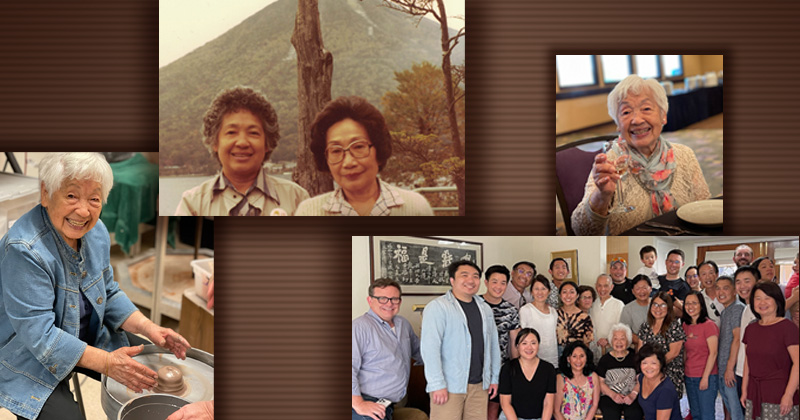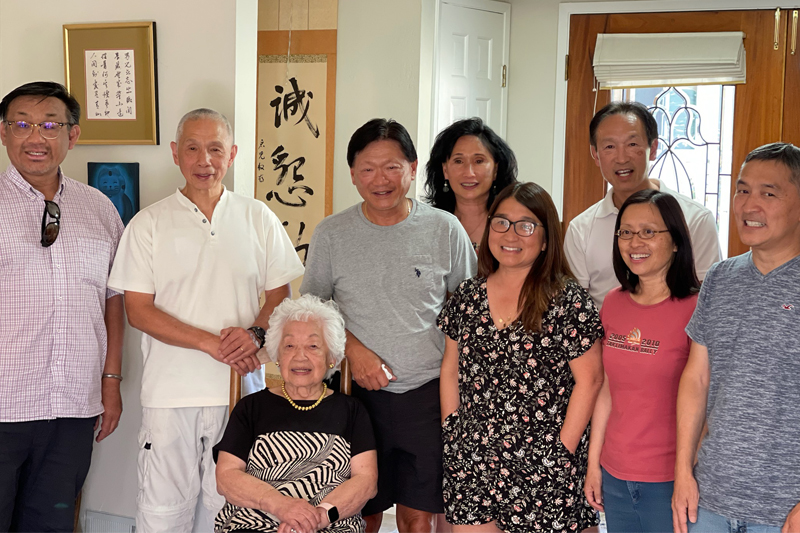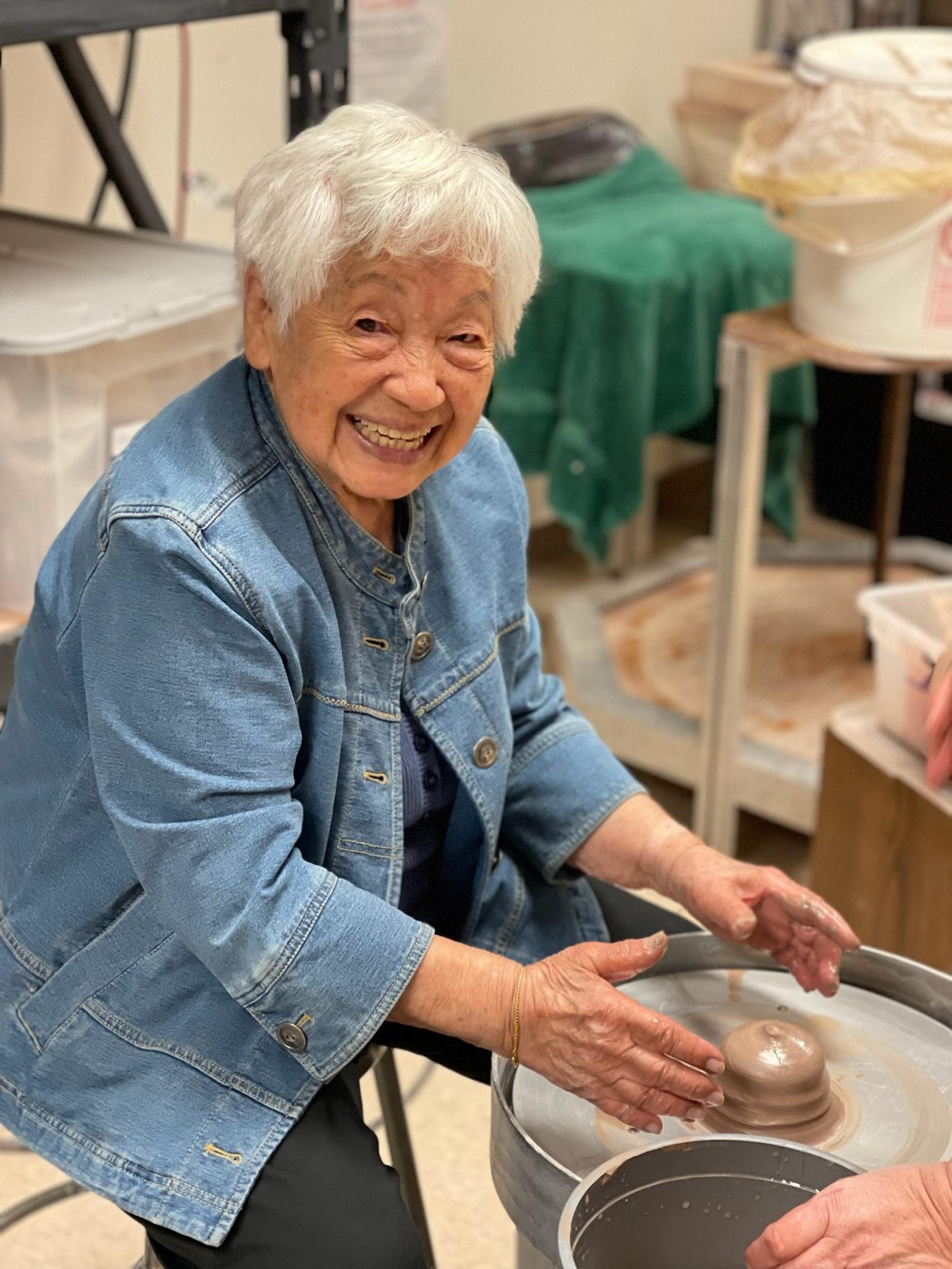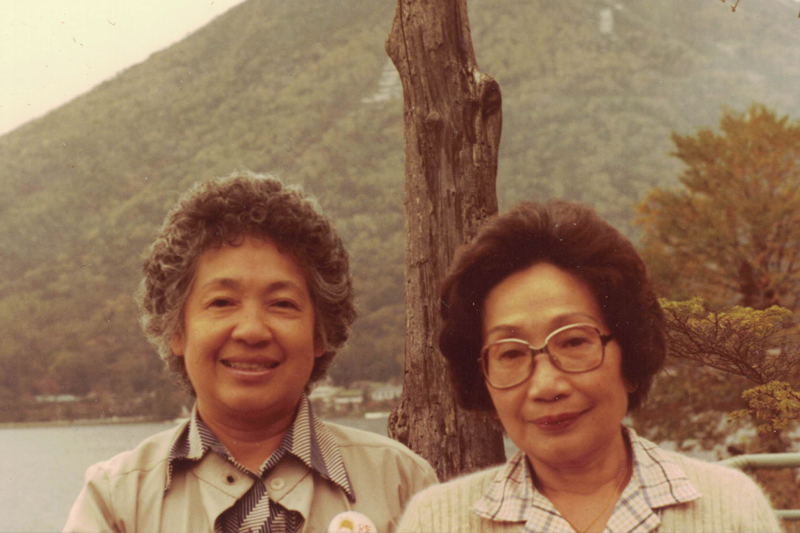
Category: News & Information

Forging her own path
Photos courtesy of Olive Hong
Displaced by war, Olive Hong, EHD58, did not graduate from Wilmington High School until age 22. Even then, she struggled to speak or write in English. But the Chinese immigrant, now 95 years old, became the first person in her family to matriculate from a university, and — despite one grueling gym class that nearly torpedoed her chances — one of the first Asian American students to graduate from UD. Other family members have followed in her Blue Hen footsteps: nephew Raymond Chin, AS73, retired school psychologist; his wife Mary Mitchell Chin, AS72, retired teacher; nephew Gordon Chin, AS73, engineer; and niece Diana Chin Wienszczak, AS75, business owner. Here, the (almost) centenarian shares a bit about her legacy, more than nine decades in the making.
What’s the secret to such a long life?
I’ve always been active — racquetball, aerobics.
Do you still do those things?
Oh, no. I’m lucky I can stand up straight without falling! I just walk on the treadmill and do a little weightlifting.
What brought your family to the U.S.?
My father came to America when he was 16. In those days, when Chinese people came here, they most likely opened a laundry place or a Chinese restaurant or grocery store. My father did all those things. When he was 24, he went back home to marry the girlfriend he’d left behind, my mother. Then he came back to America and, when he could, he applied to bring her over, too. All five of my siblings and I were born in Massachusetts.

And then?
The Depression. When I was about five, my father resettled us in Hong Kong where it would be easier to make money, and I went to kindergarten there. Eventually, when I was in junior high, World War II broke out, and the Japanese occupied the city. My father couldn’t leave — he needed to protect his home. So he stayed behind with my mother and one brother. (Another sister had died as a baby and two other brothers were in America by this time.) That left my older sister, Annie, and me. He didn’t want us to remain in Hong Kong, where soldiers were coming to look for young girls. So, when I was 13 and she was 18, we walked by ourselves to mainland China.
How is that possible?
It took 12 days. We walked from morning until sundown. At night, we slept in marketplaces that sold food and other things — they allowed refugees from Hong Kong to lie on the floor. These were outdoor places, but I do think they had rooftops. Local townspeople brought us food — plain rice.
And where did you stay once you arrived?
We walked to the village where my father is originally from. For years — until I was 16 — we stayed in a little addition to my grandmother’s house. My father had sent money to build it. We never attended school.
How did you survive?
As city folk, we didn’t have the knowledge to plant things or go fishing or collect rice straw from a field to burn for fuel. But Annie knew English, so for payment she’d write out addresses for women who wanted to send letters to their husbands in America. Also, we began knitting sweaters for money, a skill we’d learned in school. The villagers didn’t have yarn, but they brought us shawls that we unraveled. We had to knit day and night, as fast as we could. It took a week to 10 days to make one sweater.
What happened when the war ended?
We found out that two of my brothers were dead. Both had been in America when the war broke out — one was drafted into the U.S. Army and killed in the Philippines. Another got tuberculosis. But we were able to rejoin my parents in Hong Kong. I was too old to enroll in school now, but, luckily, my sister had attended this particular Catholic school, so she knew the nuns, and they allowed me in.
Why fight so hard for an education?
My father believed in it. In 1950, when I was 22 years old, he said to me: ‘Annie has moved to America to pursue the American dream; why don’t you go stay with her and continue your education there?’ I took a ship — an 18-day trip. Being docked in San Francisco for a few days before flying to meet my sister in Wilmington, Delaware, different men approached me. I told them, “No, I am here for school, not to get married.” I didn’t want to be somebody’s housewife; I wanted independence. I wanted my own money.
What was the adjustment period like for you?
Well, even at 22, I still had to finish high school. I had another year to go, so I went to Wilmington High School. I was very good at math — the teacher had me stand at the chalkboard to show students how to do things. So, when it came time to apply for college at UD, I thought I’d go for engineering, and I was accepted into that program. But my sister’s husband was an old-school guy. He told me engineering is not a career for a woman. So I switched to home economics.
Oh, wow.
It’s a big shift, I know. But what could I do? I was living with them.
You were one of only a handful of Asian students on campus at the time. Did you feel welcome?
I never saw another Chinese woman. And I don’t remember seeing any Chinese men, either. But I never felt discriminated against.

Did you enjoy your time on campus?
I had so little time. I commuted, because I had to work in the laundry that my sister and brother-in-law owned. Then they would tell me to go upstairs — we lived upstairs — and do the cooking for their four kids. I skipped church to catch up with studying on Sundays.
You must have inspired those kids, because three of four went on to UD. How does that make you feel?
I never really thought about it like that!
When you swap stories from your college days, what do you tell them?
Well, a story I tell a lot is about gym class. You had to swim the length of the pool to get your diploma, but I wouldn’t leave the shallow end. I was too scared.
But you took a boat across the ocean to begin a new life. What could be scarier than that?
The deep end. I never did pass the test. I had typhoid fever when I was eight years old, and I lost the hearing in one ear, so I had a doctor write me a note saying the chlorine might negatively affect my one good ear, and I got my diploma.
How did you find your other classes?
I remember my English teacher, Edward Rosenberry. As good as I was in math — top 5% on my entrance exam — my English was terrible, bottom 5%. He felt sorry for me, and he worked with me outside of class. The professors were very kind.
What did you do after graduation?
I worked with emotionally disturbed children at a hospital in West Chester, Pennsylvania. My job was to live with them, interact with them and report back to their social workers and psychiatrists. Then I did the same for a hospital in Providence. I was in Rhode Island in my early 30s when I met my husband, a research chemist for the government. We moved to the Midwest together, Rock Island, Illinois, and had two children. Each now has two kids of their own and I have two great grandkids as well.

Did your degree serve you at all in your career?
When I moved to the Midwest, I was on the board of the YMCA, and they asked me to teach a Chinese cooking class to raise money. It began as a hobby — I did a couple of courses for them. But it became so popular, I never stopped teaching, and I started making money. I think my home ec background helped me in that.
In 95 years, what has made you most proud?
In 1970, I formed the Quad Cities Chinese Association to bring together people of Chinese descent in the Rock Island area, to keep our culture and traditions alive. That made me very proud, and I think having a degree from UD helped give me the confidence to do it.
What remains on your bucket list?
I’m looking forward to visiting UD’s campus with family this summer. That will bring back memories.
What’s your best piece of advice for incoming Blue Hens?
I got persuaded to change my major, and that wasn’t good. If I’d stuck with it, maybe I’d be among the first women engineers from UD. Stick to what you think is good for you, good for the country, good for the world. Don’t let people talk you out of it.
Do you have your own Blue Hen family story to share? Let us know by completing this form.

